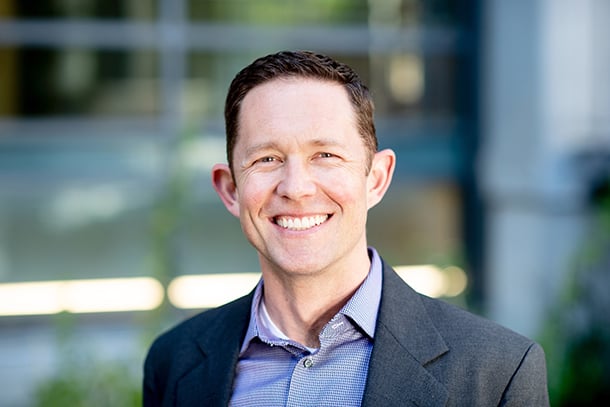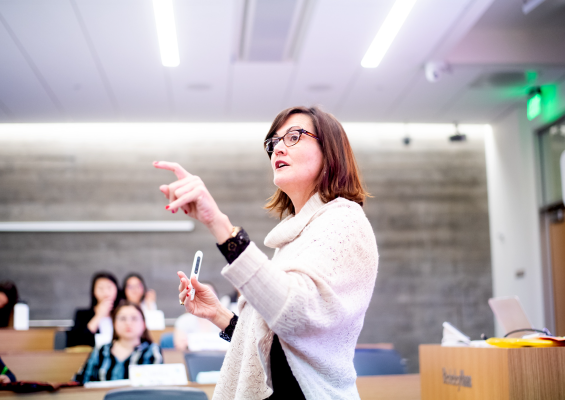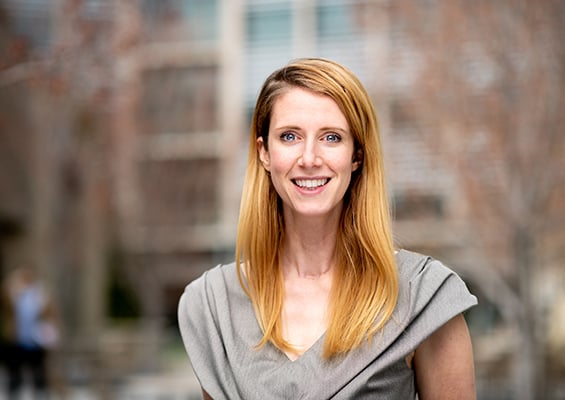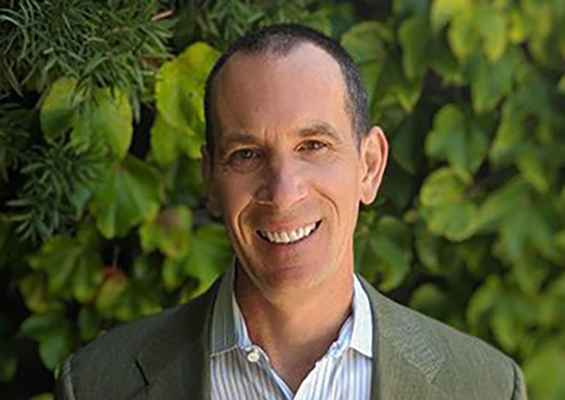Enthusiasm, listening and drawing students into participating in class are keys to becoming a successful teacher, says Professor Lucas Davis, winner of the Cheit Award for Teaching Excellence in the Berkeley Haas MBA for Executives program.
What does it take to make a good teacher?
Teaching is a continual challenge and I’m always trying to improve. I’ve found the classroom works best when everyone participates, so I’m always trying to find new ways to encourage that. If students are naturally quieter, I encourage them to step up and come more out of their comfort zones. If they’re more inclined to participate, then sometimes they need to step back and listen more. It breaks my heart, but at the end of every class I go through the list of students and note there are always a few who didn’t participate.
Also, you have to be enthusiastic about your material, and I have great enthusiasm for statistics. Every day I try to find something about the material that I’m excited about, and I’m not shy about expressing it. Sometimes you think you’re going overboard. You have to step back and encourage others because I think the best moments in the classroom are when you’re not talking. When it works it’s really magical.
How do you like teaching MBA students?
I love teaching MBA students. The EMBA students are a particular treat. I’ve had attorneys, doctors, CEOs—amazing people. Here they are coming back to school. Many of these people haven’t had statistics in a decade. They’ve faced a choice. They could say, "I’m already successful, I’m a doctor, I’ve got a career. Why do I need to question the status quo, why embrace learning?" I think it could go either way. Those who come make a choice to commit to the experience, revisit their beliefs, and listen to one another.
And I think there is something about Berkeley Haas. Our former dean, Rich Lyons, established our Defining Leadership Principles. One is Confidence Without Attitude, and that really resonates here. There is a humility about Berkeley students. Also, this is a public university where another defining principle, Question the Status Quo, is part of its tradition.
Industry across industry, we are in the middle of a revolution in which decisions are getting made less by experts and more through data analysis."
You’re an economist. What’s the hardest economic concept for MBA students to grasp?
A key idea students struggle with is thinking on the margin. Whenever you face a question of how many—like how many years of schooling should I get, or how many units of this product should I produce, or how many drinks should I have at happy hour—people tend to focus first on a number. Instead, economists think about the marginal costs and benefits. Like kindergarten—the marginal benefit is huge, while the cost is minimal. Or look at happy hour. That first drink tastes delicious, loosens you up a bit, and doesn’t cost much at happy-hour pricing. And there’s no hangover. But what about that second or third drink? What are the marginal costs and benefits of those? This is how economists solve virtually all problems when they center on a question of “how many.”
You teach courses in data analysis and decision-making. How are those important to executives?
Historically, most firms haven’t used a lot of data analysis. Most decisions were made by experts, people with a lot of experience who understood the markets they worked in. They know a lot and make decisions based on experience, instinct and their gut. But industry across industry, we are in the middle of a revolution in which decisions are getting made less by experts and more through data analysis. It’s less about what experts think and more about what the data tells them. Right now we have more and more data, but the limiting power is the ability of managers to know how to use that data—to ask the right questions and understand the power of the techniques of data analysis.
Any teaching techniques you’d like to share?
Particularly now with COVID-19, everyone is excited about flipping the classroom. This means moving some of the theory and core material outside of the classroom through videos or stream casts. If you do that, it opens the class time for more interactive activities. If I’ve prepared a video lecture, students can access it at their own convenience. They can slow it down and repeat if they need to, or speed it up if they get bored. The idea is that when students come to class they’ve already been introduced to the core theory. This gives more time for in-class exercises and participation where they can apply the knowledge. The pedagogy is better.
The expertise and insight your professors bring helps deepen and enhance your MBA journey. By selecting a top school with top-notch professors, you maximize your experience.
Read more from the Take 5 with a professor series:
- Bill Pearce says most important trait of a successful marketer is empathy
- Maura O'Neill says narrow-mindedness is the enemy of innovation
- Dave Rochlin talks flipping the classroom: MBAs learn by doing
- Clark Kellogg shares how he teaches design thinking, creativity, and innovation
- Jennifer Cohen talks equitable and inclusive leadership
- Jenny Chatman gives three benchmarks of an effective organizational culture
- Kellie McElhaney talks equity fluency, courage, and vulnerability









